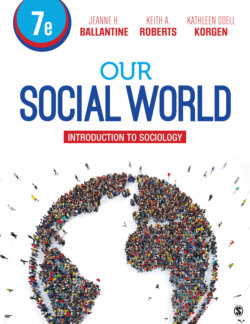Читать книгу Our Social World - Kathleen Odell Korgen - Страница 164
На сайте Литреса книга снята с продажи.
Agents of Socialization: The Micro-Meso Connection
ОглавлениеAgents of socialization are the transmitters of culture—the people, organizations, and institutions that help us define our identity and teach us how to thrive in our social world. Agents are the mechanism by which the self learns the values, beliefs, and behaviors of the culture. Agents of socialization help new members find their place, just as they prepare older members for new responsibilities in society. At the micro level, one’s family, one’s peer group, and local groups and organizations help people know how they should behave and what they should believe. At the meso level, formal sources of learning (e.g., education and religion) and informal sources of learning (e.g., the media and books) are all agents that contribute to socialization. They transmit information to children and to adults throughout their lives.
Thinking Sociologically
As you read this section, make a list of socializing agents at the micro, meso, and macro levels. Indicate two or three central messages each agent of socialization tries to instill in people. Do these messages conflict, and if so, why?
In early childhood, the family acts as the primary agent of socialization, passing on messages about respect for property and authority and the value of love and loyalty (Handel et al. 2007). Peer groups —people who are roughly equal in some status within the society, such as the same age or the same occupation—are also important, especially during the teenage years. Some writers even argue that the peer group is the most important agent in the socialization process of children and teens (Aseltine 1995; Harris 2009). Each agent has its own functions and is important at different stages of the life cycle, but meso-level institutions play a more active role as one matures. For example, schools and religious bodies become more involved in socialization as children reach 6 years old and older, compared with when they were preschool age (Rosenqvist 2017).
▲ As children become teenagers, peers become increasingly important socializing agents, shaping their norms, values, and attitudes.
© iStock.com/oscarhdez
Formal agents of socialization are official or legal agents (e.g., families, schools, teachers, and religious organizations) whose purpose it is to socialize the individual into the values, beliefs, and behaviors of the culture. For example, a primary goal of families is to teach children to speak and to learn proper behavior. In addition, schoolteachers educate by giving formal instruction, and religious organizations provide moral instruction. (These formal agents of socialization are discussed in Chapters 10–12.)
Informal agents of socialization are unofficial influential agents that shape values, beliefs, and behaviors in which socialization is not the express purpose. Examples include peers, the media, books, advertising, and the Internet. They bring us continuous messages even though their primary purpose is not socialization but entertainment or selling products. Children watch countless advertisements on television, many with messages about what is good and fun to eat and how to be more attractive, more appealing, smarter, and a better person through the consumption of products. This bombardment is a particularly influential part of socialization for children and teenagers.
Lessons from one agent of socialization generally complement those from other agents. Parents work at home to support what school and religion teach. However, at times, agents provide conflicting lessons. For example, family and faith communities often give teens messages that conflict with those of peer groups regarding sexual activity and drug use. This is an example of mixed messages given by formal and informal agents.
Thinking Sociologically
What confusion might be created for children when the formal and informal agents of socialization provide different messages about values or acceptable behaviors? Is this contradiction something that parents should be concerned about? Why or why not?
